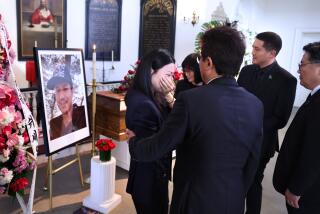Jim Preis, L.A. activist who fought for the rights of the mentally ill and disabled, dies at 66
Jim Preis, a Los Angeles lawyer and activist who fought for the rights of the the mentally ill and disabled for decades, died on Friday. He was 66.
Preis was driven by his belief that everyone “should be fighting for people who need advocates,” said his daughter, Annie Preis. He served as the head of the L.A.-based legal nonprofit Mental Health Advocacy Services for four decades, defended the rights of the mentally ill in court, lectured on mental health law and co-wrote the textbook “The Essentials of California Mental Health Law.”
Preis grew up in Los Angeles and completed his undergraduate degree in philosophy at Stanford, followed by law school at USC. In 1979, a year after he finished his law education, he took over as the head of Mental Health Advocacy Services, which is based in Koreatown. He continued to lead the organization, which provides free legal service to people with mental disabilities, until earlier this year.
Bob Sipchen, a former Los Angeles Times editor and close friend who met Preis when they lived in Mount Washington, said Preis was in law school during the release of the movie “One Flew Over the Cuckoo’s Nest.” It was around the same time that people began leaving mental institutions, often with nowhere else to go, he recalled.
“I think he was strongly influenced by that and saw the beginning of this injustice — that we were seeing so many people living on the streets,” Sipchen said. “He had a sense of obligation ... a sense of public service being the highest calling.”
Preis began paying attention to the mentally ill when it was unpopular to do so. He and colleague Sherrill Martin developed a system — eventually adopted by L.A. County — that made it easier for the mentally ill to receive disability benefits.
Elena Fiallo, director of benefits advocacy services for the county’s Department of Health Services, expressed gratitude for Preis’ work, especially “when no one else was thinking about how people access income.”
Dora Leong Gallo, head of A Community of Friends — an organization that helps provide housing to people with mental disabilities who have experienced homelessness — said that many looked to Preis when making tough decisions. He served on the organization’s board for more than 30 years. His presence had even become a deterrent to adding term limits to board seats, she said.
“Every time we think about it, there are invariably people who say, ‘But we would lose Jim!’ ” Gallo said.
Preis especially valued the experiences of people who had mental illnesses. He advocated for adding seats on the board for tenants with mental illness.
“We looked to Jim for things like that — reminding us of the value of people, the dignity of people,” Gallo said.
Robert Leventer, a friend and L.A. juvenile court commissioner, and Preis together drafted and successfully lobbied for legislation that allowed juvenile courts to bring together in one hearing several agencies that could help children who were abused or involved in the juvenile court system. Leventer said Preis believed that everyone, including people with disabilities, were on a continuum of abilities.
“He accepted a range of behaviors that a lot of people might squint at, but that he accepted that as just who people are,” Leventer said. “As a policy matter, he thought that these people should be able to live with dignity and the government is responsible to ensure that this happens.”
Many remembered Jim as quiet, caring and humble. He enjoyed sailing and boogie boarding. He was a dad who attended his son’s sporting events and his daughter’s plays, and always had time for a phone call, said his kids, Annie and John Preis.
His children followed in his footsteps, becoming lawyers.
Just a week before he was admitted to the hospital in late September, Preis was still teaching forensic psychology students, but they were coming to the house for class, John said. Preis loved teaching — he taught at UCLA and USC for decades — and had been hoping that dedicating more time to teaching would be the next chapter of his career, Annie said.
Living his entire life in California allowed Preis to maintain one odd habit: He almost exclusively wore flip-flops.
Annie Preis, 33, said her father got the idea when students from Hawaii visited his L.A. elementary school and said they wore sandals everywhere. Her father decided to wear flip-flops whenever he could. He put on shoes to go to court, though not always.
“He was sworn into federal court once when he was still in flip-flops. He was very proud of that,” said John Preis, 29.
Preis also insisted on taking public transportation almost everywhere. He shared a car with his wife, Debbie Vodhanel, but he didn’t use it much.
Jack Schwartz, a lawyer and friend of Jim’s, said they had Passover Seder together over the last few years. Every time he met up with Preis, he had taken public transit to get there.
“He would always take buses and mass transit only, because it was the better thing to do, which is sort of crazy because people in L.A. don’t usually do what’s the better thing,” Schwartz said.
After Preis stepped down from his role at Mental Health Advocacy Services, the organization planned a gala honoring his work for the end of this month. Many said they would still attend, despite Preis’ absence.
Preis was diagnosed with bladder cancer in March. Sipchen, his close friend, said it was difficult to see Preis become frail and struggle “through the same indignities that the people he was always trying to help had to go through.”
Yet, he was always, Sipchen said, “so humble, kind, generous — a bit like a saint.”
Preis is survived by his children and his wife, whom he married in 1981. He is also survived by his older brother, Peter Preis, 68.
soumya.karlamangla@latimes.com
Twitter: @skarlamangla
More to Read
Sign up for Essential California
The most important California stories and recommendations in your inbox every morning.
You may occasionally receive promotional content from the Los Angeles Times.











